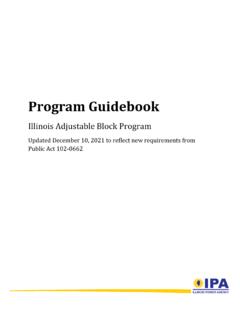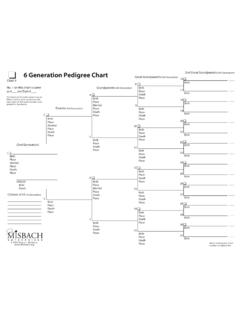Transcription of Illinois Adjustable Block Program Distributed Generation ...
1 1 Illinois Adjustable Block Program Distributed Generation PV Brochure Text (to be formatted) Draft for Stakeholder Comments Released October 3, 2018 Comments Due October 26, 2018 (This paragraph will be appropriately placed during formatting, perhaps in a box or sidebar.) Going solar is a major decision, so exercise the same caution you would when making other major consumer decisions. It is a very good idea to get quotes from at least three different contractors, and to check references before signing a contract. Also, make sure that you have read the entire contract and that you understand it before you sign it. What is the Adjustable Block Program ? The Adjustable Block Program ( ABP ) is an Illinois state-administered incentive Program for new solar photovoltaic systems.
2 It provides payments in exchange for 15 years of Renewable Energy Credits ( RECs ) generated by new residential and small to medium-sized commercial solar photovoltaic ( PV ) systems. These payments, made by Illinois utilities, vary depending on the size of the system and where it is located. The ABP provides various protections for solar consumers. What are Renewable Energy Credits and why are they valuable? Renewable Energy Credits are created when solar panels generate electricity, but they are not the electricity itself. Instead, they represent the environmental value of the electricity generated from solar panels. RECs start by belonging to the owner of the PV system, and the owner of the PV system has the right to sell or transfer the RECs to someone else. Whoever owns the RECs has the legal right to say they used that solar power.
3 This right is important to utilities that are required to supply a certain amount of their power from renewable energy, including from solar panels. These credits may also be valuable to businesses that want to be able to say that they use solar power. Credits may only be used by one entity. A typical home PV system might generate 50-200 RECs over 15 years. If you participate in the Program , you will be transferring the RECs generated from your PV system to a utility. You will not be able to claim that you re using renewable electricity, but you will be contributing to the development of renewable solar power. For more information on RECs, see this short video from the Center for Resource Solutions at Do you have to allow your RECs to be sold in order to go solar? Although you have the right to keep your RECs or to sell them to someone besides the Illinois utilities, participating in the ABP and allowing your RECs to be sold to the utilities is your best financial option.
4 Adjustable Block Program Draft Distributed Generations Brochure October 3, 2018 2 Selling your RECs through this Program will make it much more likely that your PV system will save you money. What information will you receive before you sign a contract? Before you sign a contract for a solar purchase, lease, or other installation of a PV system selling its RECs into the ABP, your contractor is required to provide you with a standard disclosure form provided by the Adjustable Block Program . This form includes contact information for everyone who has a part in your solar contract, information about the timing and steps of the installation and application process, and an estimate of how much money you will save. Review this form carefully. When deciding to install solar at your home or business, what are your financing and ownership options?
5 You can get a PV system at your home or business by buying the system, leasing it, or signing a Power Purchase Agreement ( PPA ). If you lease or sign a PPA, you don t own the system, but you get many of the benefits. For more information on these options, see Here are some things to think about when signing a PV purchase contract, lease contract, or PPA: If you re buying the system, how much will you have to pay to have it installed? Will you take out a loan to pay for the system? What are the terms of the loan and how do those loan payments compare to reductions in your monthly electric bill? If you re leasing the system, how much is your monthly lease payment? How does that payment compare to reductions in your monthly electric bill? Do you have to pay any money down at the start?
6 If you re signing a PPA, how much is the per kilowatt hour (kWh) price you will pay for the energy produced by the panels? Do you have to pay any money down at the start? Does your lease contract or PPA include an escalation clause, which increases the amount of the payments over time? If so, by how much does the payment increase? If you get solar panels, are you guaranteed to save money? What factors affect whether you save money? You are not guaranteed to save money. The questions listed below will affect whether you save money, and if so, how Some of these questions you can answer for yourself, and others can be answered by your installer or Approved Vendor. What per kilowatt-hour (kWh) rate are you paying for electricity without solar? o The higher per kWh rate you are paying for electricity before you go solar, the more money you can potentially save.
7 The per kWh rate you pay may vary depending on whether you buy electricity from your utility or have chosen to buy electricity from an Alternative Retail Electric Supplier. Is your roof good for solar? is it recently installed and in good condition? Is it south-facing? Does it get full sun? 1 Commercial and multi-family residential buildings may also be eligible for the Distributed Generation Rebate. See x for more information. Adjustable Block Program Draft Distributed Generations Brochure October 3, 2018 3 o A PV system should be installed where it gets a lot of direct sunlight ideally, on a completely unshaded south-facing roof (or other surface). If your system is partially or entirely shaded, or it doesn t face south, it will generate less electricity and be less valuable.
8 Your installer is required to perform a shading study of the site, and you should ask to see this study. o Have your roof professionally evaluated to make sure the roof can support the weight of the panels and that it won t need to be replaced during the life of the PV system. How much electricity will the system generate? Is this the right amount, given how much electricity you use? o If your system produces more electricity than you use over the course of an annual period, you may not receive credit for all the electricity it generates. How much money will you receive for your RECs? o The Approved Vendor will receive a certain amount of money from the utilities for the RECs and will pass some or all of the money along to you. Can you take advantage of the federal Investment Tax Credit (ITC)?
9 O You may qualify for a federal tax credit. Consult your tax adviser. Will the retail price of electricity increase or decrease in coming years? By how much? o The more the retail price of electricity increases, the more money you can save with solar. If the retail price of electricity decreases, generating your own electricity through solar panels may offer reduced savings or may not save you money at all. How long do you expect to stay in your home? o Especially if you lease or sign a PPA rather than buy your PV system, you may be required to take down the panels or buy out the lease if you move. This can reduce or eliminate savings from the system. Read your contract carefully to find out what happens if you move. How might a PV system affect my property tax assessment?
10 Under the Illinois Property Tax Code, if you purchase and install a rooftop PV system on your home or commercial building, your property tax assessment may increase. If you do not own the PV installation, it should not affect your property tax assessment. You should talk to your local county or other taxing authority for more information. What is net metering and how do I enroll? Net metering is the measuring and crediting system by which you are compensated for the electricity your PV system produces. If you buy your electricity directly from the utility, you will need to contact the utility to enroll in net metering. If you choose to buy your electricity from a retail electric supplier, you will need to contact it. If, at any point, you change your electricity supplier, you will need to re-enroll in net metering.







